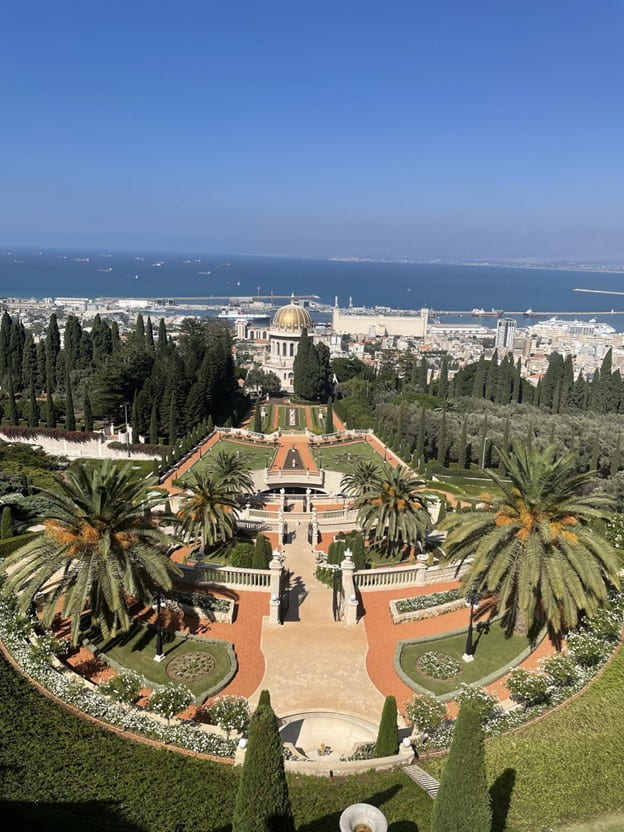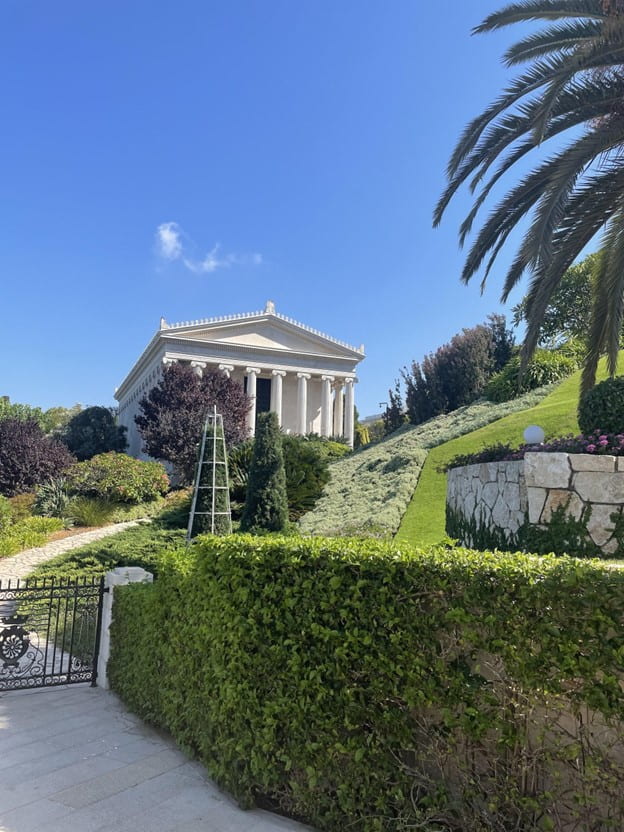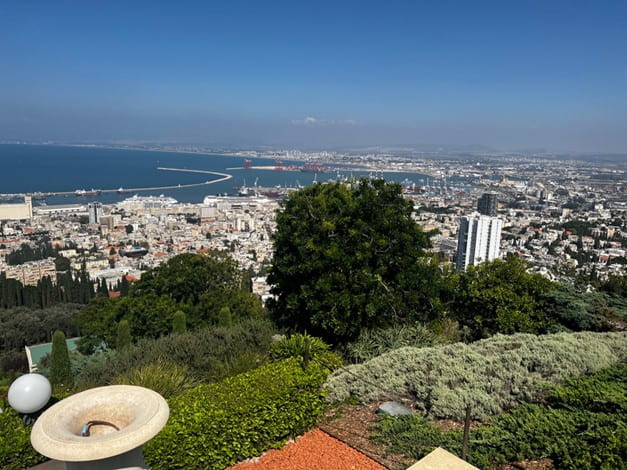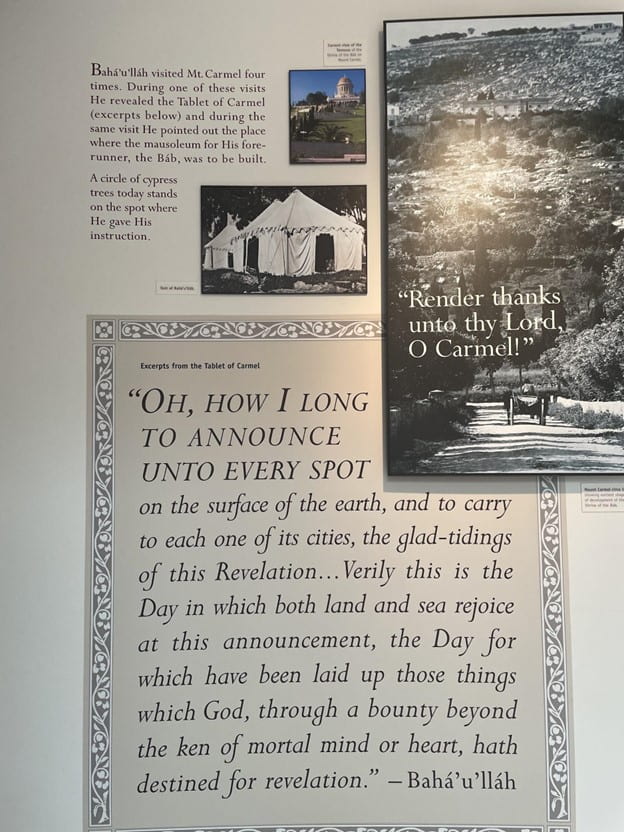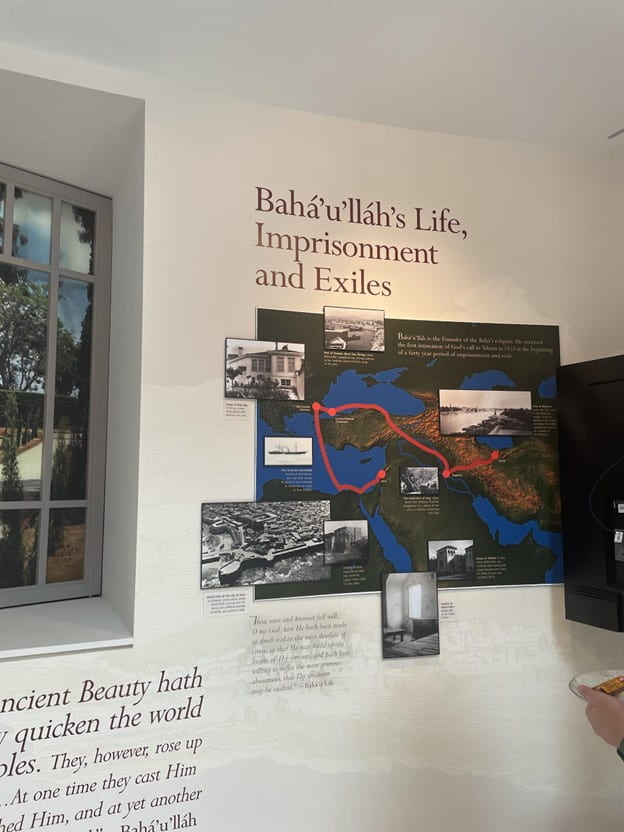By Vianey Guadian, Natalia Rodriguez, Hector Morales
After having lunch at a traditional Hummus restaurant in the center of Haifa, our bus ascended to the top of the Baha’i Gardens, situated on Mt. Carmel. Mt. Carmel maintains historical importance as a holy site and the name translates to ‘God’s’ vineyard. We observed the entire Haifa Bay from the top of this vantage point and even the mountains of Lebanon which are located about 1.5 hours north of Haifa.
The gardens have nine lower and nine upper terraces, with the temple located in the middle on its own terrace. The engineer in charge of the irrigation of the Baha’i gardens stated that the water supply is provided in part by the city of Haifa. More specifically, the gardens use water from a well, and the liquid is pumped from the lowest areas to the upper areas. Then, it is distributed across the different terraces.
The irrigation system consists of sprinklers and sprayers for the lawns, and drippers for the flowers. This equipment is provided by Netafim, an Israeli company specializing in irrigation technology. Additionally, there are three main pumps, as well as a monitoring system paired with weather stations. This software, which is also available as a phone app, allows the garden’s engineers to measure water flow to send water to the areas that need it the most and is part of the infrastructure’s main conservation efforts. Furthermore, engineers use a species-specific formula to determine the amount of water the plant loses each day to provide only the required quantity of water. So, in times of rainfall, no irrigation may be needed to maintain the gardens. The gardens well additionally captures some rainwater during rainy seasons but the engineer mentioned they are currently working on developing uses of greywater and other water conservation practices. Currently, 60 to 100 m3 of water is used every day to maintain the gardens. The Baha’i gardens keep water use below their minimum and depend less on use of city water.
After visiting the gardens, we learned about the values and history of the Baha’i religion. It is a relatively recent monotheistic religion founded in the 1800s and has over 8 million members in more than 200 countries. They emphasize the importance of unity, equality, and community service among other values. The Baha’i religion places great importance on individual prayer and reflection. Additionally, Haifa is home to the Baha’i world education center where nine council members maintain order and house various Baha’i religious texts and records. The Baha’i world center receives hundreds of visitors every year from all parts of the world which is reflective of the religion’s widespread message. Although the Baha’i temple and world center are not worship houses themselves, they are still considered very holy locations in the Baha’i religion. One important detail that may be surprising since the Baha’i temple is in Israel, is that there is not a Baha’i community in Israel, and in fact, one cannot become part of the Baha’i religion in Israel.
Despite the heat and extremely sunny weather, our visit to the Baha’i temple and gardens provided lots of insights into a very welcoming religion and the use of water engineering in one of Israel’s holy sites.
The Global Engineering Trek (GET) to Israel is jointly organized by the Northwestern Center for Water Research (NCWR) and the Israel Innovation Project (IIP). This program is focused on the topic of water (GET Water-Israel) and is offered to all first- and second-year Northwestern undergraduate students. GET Water-Israel is co-sponsored by McCormick Global Initiatives, the Institute for Sustainability and Energy at Northwestern (ISEN), the Crown Family Center for Jewish and Israel Studies, NCWR, and IIP.

